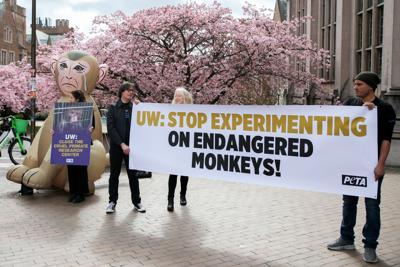Amid a busy first day of spring quarter, demonstrators gathered in Red Square to call for UW to end its involvement with primate research.
Gathered near the steps towards Drumheller Fountain, about 20 staff and volunteers from the animal rights non-profit People for the Ethical Treatment of Animals (PETA) held signs demanding UW to stop experimenting on endangered monkeys, filling the square with images of monkeys in cages.
The demonstration was a part of the organization's ongoing efforts to shut down the Washington National Primate Research Center (WaNPRC), which they call scientifically flawed and unethical. PETA staff say that holding demonstrations when campus is likely to be busy is a key component of putting pressure on the university.
“We have to get attention in order to start the discussion about animal rights,” senior campaigner for PETA Amanda Brody said. “Many people don’t know that there's an underground primate research center here.”
PETA is also calling for the removal of the WaNPRC’s director Michele Basso, calling her conduct “egregious and unethical” in a letter they delivered to the Board of Regents in person and via email Monday. The WaNPRC affirmed that Basso is qualified for the position.
The WaNPRC has been a part of UW’s campus since 1961. The center works to advance research in areas including infectious diseases, neuroscience, and stem cell therapies through experimentation on species of monkeys like the pig-tailed macaque.
Since its establishment, the center has faced questions surrounding the ethics and overall reliability of research done on non-human primates, many of which are classified as vulnerable or endangered species.
PETA’s senior science advisor for primate experimentation, Lisa Jones-Engel, spent three decades working in the primate biomedical industry, which included working at UW’s primate center for 14 years. After witnessing UW’s refusal to address the ethical and scientific flaws of the center, Jones-Engel left the field and joined PETA.
“When they refused to take accountability for their failed science, for what was happening to the monkeys, I refused to continue to be a part of it,” Jones-Engel said.
Jones-Engel, who was present at the demonstration, calls the welfare of monkeys in the center “demonstrably bad,” highlighting how monkeys face disease, painful and invasive experimentation, and no access to sunlight.
PETA says that 9,000 total primates have died at the center, and the United States Department of Agriculture has reported primates dying while undergoing surgery, MRIs, and receiving implantation maintenance, among other conditions in violation of the federal Animal Welfare Act.
“Once you see it, you never forget and you begin to really question why we’re doing it,” Jones-Engel said. “The welfare [of the primates] is horrific.”
Despite ethical concerns, Basso said in an email that the center is “committed to the humane and ethical involvement of animals in research,” such as understanding how to support the species in their natural environment.
The WaNPRC has also called some of the accusations against them unmerited and misleading, such as claims of poor conditions at a breeding facility in Arizona, where the center sources some primates.
Jones-Engel also notes that primate research just isn’t as reliable as some may think. For instance, although primates have long been used in the development of HIV vaccines – like at the UW primate center – Jones-Engel said that they have all failed in humans.
Despite these concerns, Basso said animals serve as a good model for human diseases and allow researchers to understand biological processes critical to advancing biomedical research.
But to Jones-Engel and animal-rights activists like her, there's a better way. As tension continues to build between animal activists and the university, UW will have to grapple with its involvement in primate research.
“We are one of the biggest, one of the most powerful research institutions in the country, we need to be doing better science, we should not be doing monkey science,” Jones-Engel said.
Reach reporter Scarlet Hansen at news@dailyuw.com. X: @scarlethansenn
Like what you’re reading? Support high-quality student journalism by donating here.




(1) comment
Yes, we need to stop this harmful monkey research! According to the FDA, 90% of the drugs tested on animals ultimately fail in human trials because animals can't correctly predict the toxicity to humans.
Welcome to the discussion.
Log In
Keep it Clean. Please avoid obscene, vulgar, lewd, racist or sexually-oriented language.
PLEASE TURN OFF YOUR CAPS LOCK.
Don't Threaten. Threats of harming another person will not be tolerated.
Be Truthful. Don't knowingly lie about anyone or anything.
Be Nice. No racism, sexism or any sort of -ism that is degrading to another person.
Be Proactive. Use the 'Report' link on each comment to let us know of abusive posts.
Share with Us. We'd love to hear eyewitness accounts, the history behind an article.